« The Man Who Sold The World: '02 Steve Rocco Interview Plus Bonus Text From Steve »
 Thursday, September 5, 2013 at 11:16AM
Thursday, September 5, 2013 at 11:16AM I finally got around to scanning this Steve Rocco interview from the January 2002 issue of Skateboarder. While I was on vacation I also heard the news that Skateboarder would be closing up shop (again) after the current issue. I wanted to take this opportunity to thank Aaron Meza for giving me my first mag staffer job there back in '01 and letting me pretty much nerd out on everything I ever wanted to explore in skateboard history. Also thanks to Jamie Owens for keeping it top notch and running all the way to the end (or third interlude).
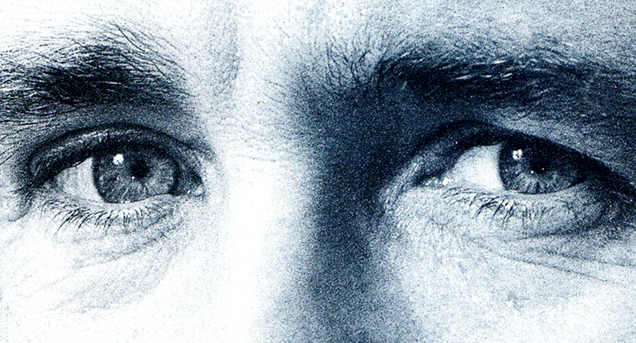
Skateboarding (or the industry at least) is once again back at somewhat of a jumping off point with all the recent new companies popping up and the entrenched old guard. Whoever the next Rocco is (Pontus? Olson?), I'd say Steve's words are as relevant today as ever. Shots out to his Malibu trailer. All Photos: Mike O'Meally —ME
PART 1: THE INTERVIEW
The Man Who Sold the World
The Steve Rocco Interview
The worst decision Brad Dorfman ever made was kicking Steve Rocco off Sims. Had he known what would ensue, he probably would have kept Rocco’s pro freestyle model on the shelves indefinitely, with the rest of the industry pitching in to foot the bill. When they kicked him out of their house, Rocco did what any self-respecting entrepreneur would do, he built his own house on their front lawn. After giving birth to World Industries, Steve Rocco forged an empire larger and more diverse than anything Brad Dorfman ever imagined. More importantly, Rocco took no prisoners. He stole riders, attacked industry giants Vision and Powell, broke the rules, and forever changed the way skateboarders do business.
When did it first occur to you to start a company? Was there any planned direction?
It actually never occurred to me to start a company. I was just a skater at the time that had just been kicked off the team. I thought my life; at least the part that had anything to do with skating, was over. It was Skip Engblom's (from Santa Monica Airlines) idea to start a company. As for direction there was absolutely none. Skip showed me the basics, where to get boards made and where to sell them, beyond that I was clueless. Which in hindsight was a blessing. If I had known what I was attempting to do was impossible I doubt I would have tried and no one would have joined up with me.
Did you have this vision of a new skateboard industry or did it just happen?
My “vision” for the skateboard industry was simple. Skaters should be able to have input into their products. It should be more of a team effort. Before we started World Industries, business guys decided everything because they did not think skaters had the mentality for marketing or product design. Guys like Rodney Mullen had his wheel designs turned down by George Powell and I was told by Brad Dorfman that street skating was never going to be big.
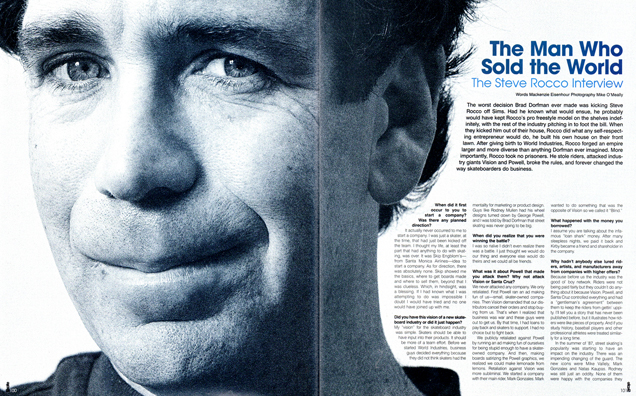
When did you realize that you were winning the battle?
I was so naïve I didn’t even realize there was a battle. I just thought we would do our thing and everyone else would do theirs and we could all be friends.
What was it about Powell that made you attack them. Why not attack Vision or Santa Cruz?
We never attacked any company. We only retaliated. First Powell ran an ad making fun of us small skater-owned companies. Then Vision demanded that our distributors cancel their orders and stop buying from us. That’s when I realized that business was war and these guys were out to get us. By that time I had loans to pay back and skaters to support. I had no choice but to fight back.
We publicly retaliated against Powell by running an ad making fun of ourselves for being stupid enough to have a skater owned company. And then making boards satirizing the Powell graphics we realized we could make lemonade from lemons. Retaliation against vision was more subliminal. We started a company with their main rider, Mark Gonzales. Mark wanted to do something that was the opposite of Vision so we called it Blind.
What happened with the money you borrowed?
I assume you are talking about the infamous “loan shark”money. After many sleepless nights we paid it back and Kirby became a friend and shareholder in the company.
Why hadn't anybody else lured riders/artists/manufacturers away from companies with higher offers?
Because before us the industry was the good ol’ boy network. Riders were not being paid fairly but they couldn’t do anything about it because Vision, Powell and Santa Cruz controlled everything and had a “gentleman’s agreement” between them to keep the riders from gettin’ uppity. I’ll tell you a story that has never been published before but it illustrates how riders were like pieces of property. And if you study history, baseball players and other professional athletes were treated similarly for a long time.
In the summer of 1987 street skating’s popularity was starting to have an impact on the industry. There was an impending changing of the guard. The new icons were Mike Vallely, Mark Gonzales and Natas Kaupas. Rodney was still just an oddity. None of them were happy with the companies they rode for and wanted a change. The four of us wanted start a company that only had to do with street skating and we wanted Santa Cruz to back it. Novak sat in the room and listened politely as I unfurled my master plan; but in the end he said he didn’t have the resources to do such a project, wished me luck and sent me on my way. Years later, I found out that Novak had immediately called Brad Dorfman from Vision and alerted him to the potential rebellion. That’s when I finally learned the real reason I was removed from the Sims/Vision team. All that time I thought it was just because I was a trouble making pain in the ass.
What stolen rider caused the most backlash from another company?
That would have to be Mike Valley. Powell threatened to sue us and Mike. We were pretty worried. In hindsight they could have wiped us out if they had the visionary fortitude.
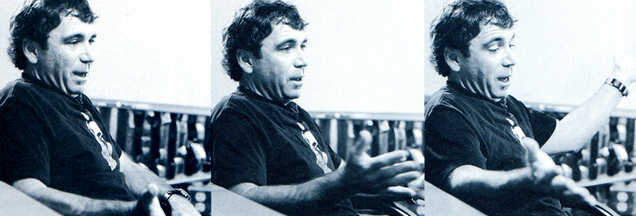
Who was the most difficult rider to deal with?
I won’t mention any names, but when there is no mutual trust it is hard to have a good working relationship with anyone.
Where do you draw the line in business? Is there a line?
I’ve always drawn the line just south of my competitors previous line, but we would never stoop to dishonesty to gain victory. There is no honor in that.
In retrospect, was there ever a time were you feel you went too far?
No that would imply regret and everything we’ve done has worked out very well. Even the things that seemed bad at the time.
Were low-budget ads a conscious decision or were they born out of necessity?
First off they weren’t low budget to us. Secondly none of our first ads were very premeditated. Usually we started and finished on deadline day. We had neither time nor money to fix them up. For us, the most important part of advertising was making a statement and just having fun. We did not take anything very seriously in the beginning. I don’t think we even did product ads for the first five or six years.
Was copyright infringement part of a master plan for exposure?
No, it was just part of our ignorance and irreverence.
Does everyone have a price?
It would seem so.
What is the craziest thing you have paid somebody to do?
We once paid a fifteen-year-old girl to parade around a demo topless. Which now doesn’t seem so outlandish but ten years ago it was pretty nuts. Basically we tried to make sure every kid who ever came to our demos would have a great and memorable time. We also made it difficult for our competitors to show up a week later and do something better.
What's the biggest rumor you have heard about yourself? Why were you villainized?
That could be a whole other interview. The newest rumor is that I’m going to jail because the owner of VK Sports hired someone to steal from us but the DA messed up the case and I’m getting prosecuted. Basically the villianization was either poor sportsmanship, ignorance or jealously.
How much product has been stolen from the warehouse over the years?
VK Sports stole the most, we estimate $500,000 worth of product.
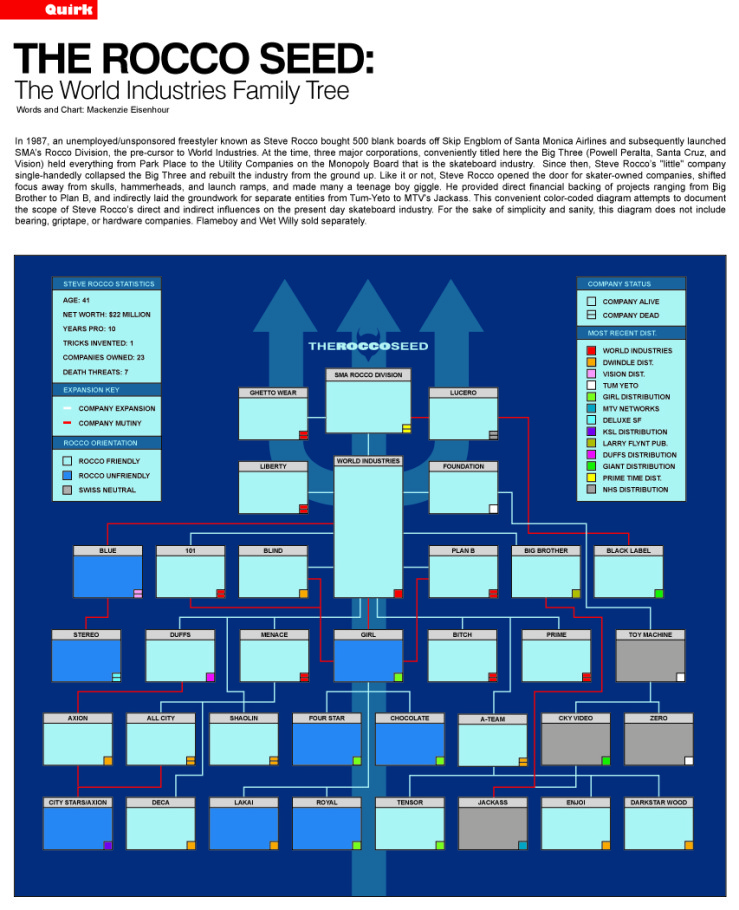 The Rocco Seed column also from Skateboarder.
The Rocco Seed column also from Skateboarder.
Give us a good Jesse Martinez story? Is Jesse still on the payroll?
Jesse was our first pro. he’s not on the payroll but we’ll always take care of him. His first graphic made for a good story. At the time we had neither an artist, nor the money to hire one. But we needed a graphic for his pro model right away. Jesse said he knew this guy that was a good artist but sort of a sketchy character. Jesse told me to give him $100 and he’d get a graphic out of the guy by the next day. I just rolled my eyes and gave him the cash, thinking I would never see a graphic. Sure enough, the next day Jesse shows up and tells me he has some good news and some bad news. I ask for the good news first. He says “I got the graphic.” I asked him how he pulled it off and he simply said, “I got him stoned out of his mind and bought him a pizza.” What’s the bad news he looked at sort of ashamed and said ‘I got stoned too and fell asleep’ what’s so bad about that I asked. Jesse reached into a paper sack and pulled out a messed up pizza box with a drawing on it. ‘I forgot to tell him to use paper’. That’s the story of our first graphic. It came complete with cheese and pepperoni stains. You probably wanted to hear a story where Jesse kicks someone’s ass. Well don’t worry, after reading this he’ll be knocking on your door.
Of all the companies you have owned, what was your favorite?
The early Blind team was very special. Mark Gonzales, Jason Lee, Guy Mariano and Rudy Johnson. Besides being great skaters I had a lot of fun hanging out with them.
What was it about Rodney Mullen that made you feel like he could be a good business partner?
Rodney had the perfect combination of wealth, gullibility and absenteeism necessary for a good working partnership. For the first three years he was scared to come by the warehouse because Kirby would “coincidentally” always show up looking for a payment when I wasn’t there. That would shake Rod up quite a bit. I’d find him huddled at his desk, white as a ghost, repeating “Kirby ,money, late, not good.” Rodney never said things were bad just not good or not so good depending on the severity. Hitler wasn’t bad he was just “not so good.”
As things progressed two things happened to get Rodney more involved. The first being Mike Ternasky getting him to do his flatland tricks in the street. Something Stacey Peralta and I both failed miserably at. But Mike T. knew how to pull Rod’s strings. Instead
of promising him fame and fortune (which is a good thing because he sure didn’t get that.) he got him a whole new level of respect from the skaters. You could see the fear in some of the their eyes because they knew Rodney was slowly raising the bar and as I knew from the old freestyle days; it could be tough to impossible to keep up. The second involvement factor was a little something the banks like to call a U.G. or an Unconditional Personal Guarantee. Since Rodney owned more than 10% of the company he had to sign on. This basically meant if we screwed up the company the bank would take all his stuff. Which didn’t seem like such a big deal at the time because his father had already disinherited him for dropping out of college to work with me. So he had nothing left to loose anyway.
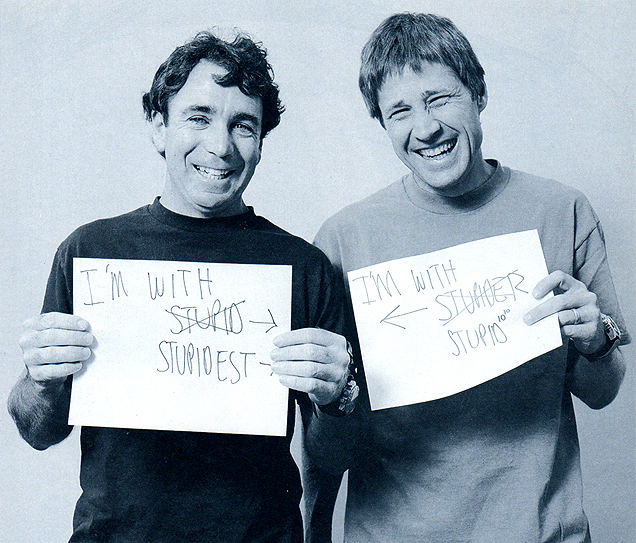 Steve and Rodney.
Steve and Rodney.
What lost team rider affected you the most? Is there any beefs left in the industry?
When Rick Howard took all the riders and started Girl that was pretty devastating. Not so much because they left but because of the hatred he tried to instill in the riders and the pack of lies he fueled it with. If he wanted to have a war with me that would have been fine, I’m always down for a battle. But he pulled Rodney and Mike Ternasky (the Plan B founder that lost half his team to Rick) into it as well by demonizing them. Anyone who ever met either of these guys knows they are about as honest, sincere and caring as anyone that ever walked the planet. In fact, before Mike died he made me promise never to attack Girl or Rick. He then challenged me to beat them in a whole new way. That’s when I came up with the idea (with an assist from Marc McKee) of basing World Industries on cartoon characters. As for beefs I don’t have any. I’d actually like to take this opportunity to thank Rick. He not only helped me think on a new level of marketing and business but made me a better person as well. Oh, I almost forgot, he also made me wealthy beyond my wildest dreams.
What is more rewarding, starting a company or selling it?
You forgot to mention destroying. They are both rewarding in different ways. Starting a company is definitely a rush and selling is more of a relief.
What companies do you still own outright?
I’m a large shareholder in World, Blind, Darkstar, Tensor, Deca, enjoi, Speedemons, Dub and Droors. It’s great to just sit back and watch the guys that have been there a long time like Rodney and Marc McKee kick ass with Tensor, World and Blind. and the young guys like Chet Thomas and Marc Johnson start to make an impact with Darkstar and enjoi.
Is skateboard industry too safe again?
Yes, but not for long. Soon the barbarians will be at the gates again and somebody better be there to slam it in their faces. Otherwise they’ll end up eating our industry for breakfast.
What advice do you have for skate industry entrepreneurs starting out today?
You’re never going to beat the big guys out there today at their own game. They are so good compared with what Powell Peralta and Vision were. Not only in the product they make, the direction they take their companies, and the strengths of their benches but they have an expansive radar. They will see you coming from miles away. You need to think outside the box, disregard the rules and do things unlike anyone has done them before. Let your inner child run free.
The trailer for the '07 Documentary of the same name.

Reader Comments